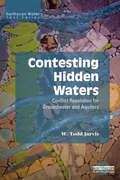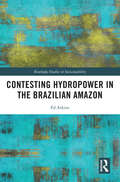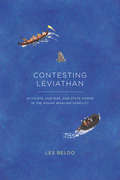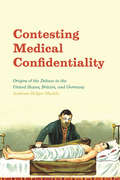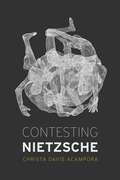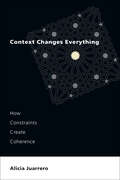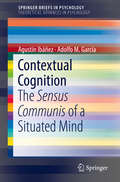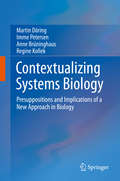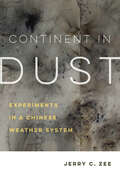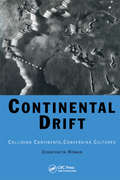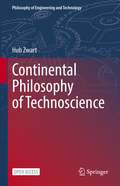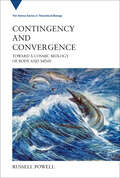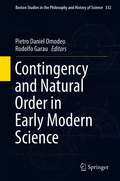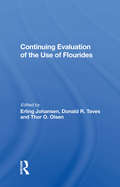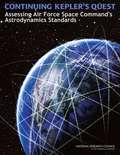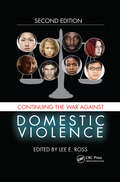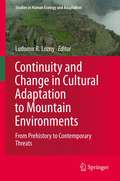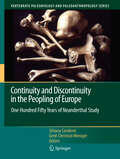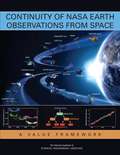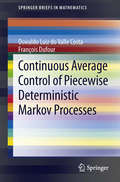- Table View
- List View
Contesting Hidden Waters: Conflict Resolution for Groundwater and Aquifers (Earthscan Water Text)
by W. Todd JarvisThe world increasingly relies on groundwater resources for drinking water and the provision of food for a growing population. The utilization of aquifer systems also extends beyond freshwater supply to include other resources such as heat extraction and the storage and disposal of substances. Unlike other books about conflict resolution and negotiations over water resources, this volume is unique in focusing exclusively on conflicts over groundwater and aquifers. The author explores the specific challenges presented by these "hidden" resources, which are shown to be very different from those posed by surface water resources. Whereas surface watersheds are static, groundwater boundaries are value-laden and constantly changing during development. The book describes the various issues surrounding the governance and management of these resources and the various parties involved in conflicts and negotiations over them. Through first-hand accounts from a pracademic skilled in both process and substance as a groundwater professional and professional mediator, the book offers options for addressing the challenges and issues through a transdisciplinary approach.
Contesting Hydropower in the Brazilian Amazon (Routledge Studies in Sustainability)
by Ed AtkinsIn Contesting Hydropower in the Brazilian Amazon, Ed Atkins focuses on how local, national, and international civil society groups have resisted the Belo Monte and São Luiz do Tapajós hydroelectric projects in Brazil. In doing so, Atkins explores how contemporary opposition to hydropower projects demonstrate a form of ‘contested sustainability’ that highlights the need for sustainable energy transitions to take more into account than merely greenhouse gas emissions. The assertion that society must look to successfully transition away from fossil fuels and towards sustainable energy sources often appears assured in contemporary environmental governance. However, what is less certain is who decides which forms of energy are deemed ‘sustainable.’ Contesting Hydropower in the Brazilian Amazon explores one process in which the sustainability of a ‘green’ energy source is contested. It focuses on how civil society actors have both challenged and reconfigured dominant pro-dam assertions that present the hydropower schemes studied as renewable energy projects that contribute to sustainable development agendas. The volume also examines in detail how anti-dam actors act to render visible the political interests behind a project, whilst at the same time linking the resistance movement to wider questions of contemporary environmental politics. This interdisciplinary work will be of great interest to students and scholars of sustainable development, sustainable energy transitions, environmental justice, environmental governance, and development studies.
Contesting Leviathan: Activists, Hunters, and State Power in the Makah Whaling Conflict
by Les BeldoIn 1999, off the coast of the Pacific Northwest, the first gray whale in seven decades was killed by Makah whalers. The hunt marked the return of a centuries-old tradition and, predictably, set off a fierce political and environmental debate. Whalers from the Makah Indian Tribe and antiwhaling activists have clashed for over twenty years, with no end to this conflict in sight. In Contesting Leviathan, anthropologist Les Beldo describes the complex judicial and political climate for whale conservation in the United States, and the limits of the current framework in which whales are treated as “large fish” managed by the National Marine Fisheries Service. Emphasizing the moral dimension of the conflict between the Makah, the US government, and antiwhaling activists, Beldo brings to light the lived ethics of human-animal interaction, as well as how different groups claim to speak for the whale—the only silent party in this conflict. A timely and sensitive study of a complicated issue, this book calls into question anthropological expectations regarding who benefits from the exercise of state power in environmental conflicts, especially where indigenous groups are involved. Vividly told and rigorously argued, Contesting Leviathan will appeal to anthropologists, scholars of indigenous culture, animal activists, and any reader interested in the place of animals in contemporary life.
Contesting Medical Confidentiality: Origins of the Debate in the United States, Britain, and Germany
by Andreas-Holger MaehleMedical confidentiality is an essential cornerstone of effective public health systems, and for centuries societies have struggled to maintain the illusion of absolute privacy. In this age of health databases and increasing connectedness, however, the confidentiality of patient information is rapidly becoming a concern at the forefront of worldwide ethical and political debate. In Contesting Medical Confidentiality, Andreas-Holger Maehle travels back to the origins of this increasingly relevant issue. He offers the first comparative analysis of professional and public debates on medical confidentiality in the United States, Britain, and Germany during the late nineteenth and early twentieth centuries, when traditional medical secrecy first came under pressure from demands of disclosure in the name of public health. Maehle structures his study around three representative questions of the time that remain salient today: Do physicians have a privilege to refuse court orders to reveal confidential patient details? Is there a medical duty to report illegal procedures to the authorities? Should doctors breach confidentiality in order to prevent the spread of disease? Considering these debates through a unique historical perspective, Contesting Medical Confidentiality illuminates the ethical issues and potentially grave consequences that continue to stir up public debate.
Contesting Nietzsche
by Christa Davis AcamporaA brilliant exploration of a significant and understudied aspect of Nietzsche’s philosophy. In this groundbreaking work, Christa Davis Acampora offers a profound rethinking of Friedrich Nietzsche’s crucial notion of the agon. Analyzing an impressive array of primary and secondary sources and synthesizing decades of Nietzsche scholarship, she shows how the agon, or contest, organized core areas of Nietzsche’s philosophy, providing a new appreciation of the subtleties of his notorious views about power. By focusing so intensely on this particular guiding interest, she offers an exciting, original vantage from which to view this iconic thinker: Contesting Nietzsche. Though existence—viewed through the lens of Nietzsche’s agon—is fraught with struggle, Acampora illuminates what Nietzsche recognized as the agon’s generative benefits. It imbues the human experience with significance, meaning, and value. Analyzing Nietzsche’s elaborations of agonism—his remarks on types of contests, qualities of contestants, and the conditions in which either may thrive or deteriorate—she demonstrates how much the agon shaped his philosophical projects and critical assessments of others. The agon led him from one set of concerns to the next, from aesthetics to metaphysics to ethics to psychology, via Homer, Socrates, Saint Paul, and Wagner. In showing how one obsession catalyzed so many diverse interests, Contesting Nietzsche sheds fundamentally new light on some of this philosopher’s most difficult and paradoxical ideas.
Context Changes Everything: How Constraints Create Coherence
by Alicia JuarreroFrom the influential author of Dynamics in Action, how the concepts of constraints provide a way to rethink relationships, opening the way to intentional, meaningful causation.Grounding her work in the problem of causation, Alicia Juarrero challenges previously held beliefs that only forceful impacts are causes. Constraints, she claims, bring about effects as well, and they enable the emergence of coherence. In Context Changes Everything, Juarrero shows that coherence is induced by enabling constraints, not forceful causes, and that the resulting coherence is then maintained by constitutive constraints. Constitutive constraints, in turn, become governing constraints that regulate and modulate the way coherent entities behave. Using the tools of complexity science, she offers a rigorously scientific understanding of identity, hierarchy, and top-down causation, and in so doing, presents a new way of thinking about the natural world. Juarrero argues that personal identity, which has been thought to be conferred through internal traits (essential natures), is grounded in dynamic interdependencies that keep coherent structures whole. This challenges our ideas of identity, as well as the notion that stability means inflexible rigidity. On the contrary, stable entities are brittle and cannot persist. Complexity science, says Juarrero, can shape how we meet the world, how what emerges from our interactions finds coherence, and how humans can shape identities that are robust and resilient. This framework has significant implications for sociology, economics, political theory, business, and knowledge management, as well as psychology, religion, and theology. It points to a more expansive and synthetic philosophy about who we are and about the coherence of living and nonliving things alike.
Contextual Cognition: The Sensus Communis of a Situated Mind (SpringerBriefs in Psychology)
by Agustín Ibáñez Adolfo M. GarcíaThis Brief introduces two empirically grounded models of situated mental phenomena: contextual social cognition (the collection of psychological processes underlying context-dependent social behavior) and action-language coupling (the integration of ongoing actions with movement-related verbal information). It combines behavioral, neuroscientific, and neuropsychiatric perspectives to forge a novel view of contextual influences on active, multi-domain processes. Chapters highlight the models' translational potential for the clinical field by focusing on diseases compromising social cognition (mainly illustrated by behavioral variant frontotemporal dementia) and motor skills (crucially, Parkinson’s disease). A final chapter sets forth metatheoretical considerations regarding intercognition, the constant binding of processes triggered by environmental and body-internal sources, which confers a sensus communis to our experience. In addition, the book includes two commentaries written by external peers pondering on advantages and limits of the proposal. Contextual Cognition will be of interest to students, teachers, and researchers from the fields of cognitive science, neurology, psychiatry, neuroscience, psychology, behavioral science, linguistics, and philosophy.
Contextualizing Systems Biology: Presuppositions and Implications of a New Approach in Biology
by Martin Döring Imme Petersen Anne Brüninghaus Regine KollekThis collective monograph aims at contributing to an improved understanding of the epistemic presumptions, sociocultural implications and historically backgrounds of the newly emerging and currently expanding approach of systems biology. In doing so, it offers empirically grounded, valuable and reflexive information about a paradigmatic shift in the biosciences for a wide range of scientists working in the interdisciplinary areas of systems biology, synthetic biology, molecular biology, biology, the philosophy of science, the sociology of science and scientific knowledge, science and technology studies, technology assessment and the like. The authors of this monograph share the theoretical methodological premise that science is a culturally and socially embedded practice which characterizes our culture as a scientific one and at the same time draws its innovative potential from its socio-cultural context. This dialectic relationship lies at the heart of the current development of systems biology which is conceived as a so-called successor of '-omics' research and triggered by high-throughput information technologies. At the same time a need for a holistic conceptualization of complex biological processes emerges. The title Contextualizing Systems Biology suggests that this book analyzes the development and advent of systems biology from different theoretical and methodological perspectives. We investigate a variety of contexts ranging from the analysis of cognitive contexts (such as basic theoretical concepts) to regulative contexts (policies) to the concrete application of a systems biology in the socio-scientific context of a European research project. In empirically analyzing these different and interrelated layers and dimensions of systems biology, the scope of the book goes beyond present attempts to investigate the advent of new approaches in the biological sciences as it frames and assesses systems biology from an interdisciplinary and integrated perspective.
Continent in Dust: Experiments in a Chinese Weather System (Critical Environments: Nature, Science, and Politics #10)
by Jerry C. ZeeIn China, the weather has changed. Decades of reform have been shadowed by a changing meteorological normal: seasonal dust storms and spectacular episodes of air pollution have reworked physical and political relations between land and air in China and downwind. Continent in Dust offers an anthropology of strange weather, focusing on intersections among statecraft, landscape, atmosphere, and society. Traveling from state engineering programs that attempt to choreograph the movement of mobile dunes in the interior, to newly reconfigured bodies and airspaces in Beijing, and beyond, this book explores contemporary China as a weather system in the making: what would it mean to understand "the rise of China" literally, as the country itself rises into the air?
Continental Drift: Colliding Continents, Converging Cultures
by Constantin RomanContinental Drift: Colliding Continents, Converging Cultures is as much an account of the impressions Western culture made on Constantin Roman as a young researcher from behind the Iron Curtain as a personal history of the developing new science of plate tectonics. The book elucidates the author's struggles against a web of bureaucracy to secure hi
Continental Philosophy of Technoscience (Philosophy of Engineering and Technology #38)
by Hub ZwartThe key objective of this volume is to allow philosophy students and early-stage researchers to become practicing philosophers in technoscientific settings. Zwart focuses on the methodological issue of how to practice continental philosophy of technoscience today. This text draws upon continental authors such as Hegel, Engels, Heidegger, Bachelard and Lacan (and their fields of dialectics, phenomenology and psychoanalysis) in developing a coherent message around the technicity of science or rather, “technoscience”. Within technoscience, the focus will be on recent developments in life sciences research, such as genomics, post-genomics, synthetic biology and global ecology. This book uniquely presents continental perspectives that tend to be underrepresented in mainstream philosophy of science, yet entail crucial insights for coming to terms with technoscience as it is evolving on a global scale today.This is an open access book.
Contingency and Convergence: Toward a Cosmic Biology of Body and Mind (Vienna Series in Theoretical Biology #25)
by Russell PowellCan we can use the patterns and processes of convergent evolution to make inferences about universal laws of life, on Earth and elsewhere?In this book, Russell Powell investigates whether we can use the patterns and processes of convergent evolution to make inferences about universal laws of life, on Earth and elsewhere. Weaving together disparate philosophical and empirical threads, Powell offers the first detailed analysis of the interplay between contingency and convergence in macroevolution, as it relates to both complex life in general and cognitively complex life in particular. If the evolution of mind is not a historical accident, the product of convergence rather than contingency, then, Powell asks, is mind likely to be an evolutionarily important feature of any living world? Stephen Jay Gould argued for the primacy of contingency in evolution. Gould's “radical contingency thesis” (RCT) has been challenged, but critics have largely failed to engage with its core claims and theoretical commitments. Powell fills this gap. He first examines convergent regularities at both temporal and phylogenetic depths, finding evidence that both vindicates and rebuffs Gould's argument for contingency. Powell follows this partial defense of the RCT with a substantive critique. Among the evolutionary outcomes that might defy the RCT, he argues, cognition is particularly important—not only for human-specific issues of the evolution of intelligence and consciousness but also for the large-scale ecological organization of macroscopic living worlds. Turning his attention to complex cognitive life, Powell considers what patterns of cognitive convergence tell us about the nature of mind, its evolution, and its place in the universe. If complex bodies are common in the universe, might complex minds be common as well?
Contingency and Natural Order in Early Modern Science (Boston Studies in the Philosophy and History of Science #332)
by Pietro Daniel Omodeo Rodolfo GarauThis volume considers contingency as a historical category resulting from the combination of various intellectual elements – epistemological, philosophical, material, as well as theological and, broadly speaking, intellectual. With contributions ranging from fields as diverse as the histories of physics, astronomy, astrology, medicine, mechanics, physiology, and natural philosophy, it explores the transformation of the notion of contingency across the late-medieval, Renaissance, and the early modern period. Underpinned by a necessitated vision of nature, seventeenth century mechanism widely identified apparent natural irregularities with the epistemological limits of a certain explanatory framework. However, this picture was preceded by, and in fact emerged from, a widespread characterization of contingency as an ontological trait of nature, typical of late-Scholastic and Renaissance science. On these bases, this volume shows how epistemological categories, which are preconditions of knowledge as “historically-situated a priori” and, seemingly, self-evident, are ultimately rooted in time. Contingency is intrinsic to scientific practice. Whether observing the behaviour of a photon, diagnosing a patient, or calculating the orbit of a distant planet, scientists face the unavoidable challenge of dealing with data that differ from their models and expectations. However, epistemological categories are not fixed in time. Indeed, there is something fundamentally different in the way an Aristotelian natural philosopher defined a wonder or a “monstrous” birth as “contingent”, a modern scientist defines the unexpected result of an experiment, and a quantum physicist the behavior of a photon. Although to each inquirer these instances appeared self-evidently contingent, each also employs the concept differently.
Contingent Valuation of Yangtze Finless Porpoises in Poyang Lake, China
by Yanyan DongThis book presents the findings of the study, and offers analysis of both its methodological and policy-related implications. On the methodology side, it assesses and validates the valuation workshop approach; appraises the effect of distance on willingness to pay and the influence of the respondents' ability to pay. From a policy perspective, the book examines the attitudes and preference of respondents on trade-offs between economic growth and ecological use.
Continuing Assistance to the National Institutes of Health on Preparation of Additional Risk Assessments for the Boston University NEIDL, Phase 1
by National Research Council of the National AcademiesIn 2003, the Boston University Medical Center (BUMC) was awarded a $128 million grant from the National Institutes of Health to build one of two high- and maximum- containment laboratory facilities for research on biological pathogens. The National Emerging Infectious Disease Laboratories (NEIDL) are meant to support the National Institute of Allergy and Infectious Diseases and biodefense research agenda, conducting research to develop new approaches to treating, preventing, and diagnosing a variety of viral diseases. Diseases and agents to be studied include viruses and bacteria that occur naturally and cause infections or that could be used in deliberate attacks. Continuing Assistance to the National Institutes of Health on Preparation of Additional Risk Assessments for the Boston University NEIDL, Phase 1 reviews the proposed risk assessment plans associated with operating the NEIDL and provides input on key milestones in the development of supplementary risk assessment.
Continuing Assistance to the National Institutes of Health on Preparation of Additional Risk Assessments for the Boston University NEIDL, Phase 3
by Committee on Continuing Assistance to the National Institutes of Health on Preparation of Additional Risk Assessments for the Boston University NEIDLIn 2003, the Boston University Medical Center (BUMC) was awarded a $128 million grant from the National Institutes of Health (NIH) to build one of two national maximum-containment laboratory facilities for pathogen research. The National Emerging Infectious Diseases Laboratories (NEIDL) are meant to support the National Institute of Allergy and Infectious Diseases' biodefense research agenda, conducting research to develop new approaches to treating, preventing, and diagnosing a variety of bacterial and viral diseases. The facility includes a biosafety level 4 (BSL-4) containment laboratory housed in a 192,000 square foot building. Although the NEIDL BSL-4 laboratory accounts for only 13 percent of the building's total space, it has been the source of virtually all of the community concern surrounding this project. The location of the facility on Albany Street in Boston's South End, which is an environmental justice community, has been controversial, and there have been numerous public meetings over the plans for the facility as well as three legal actions challenging the project. Continuing Assistance to the National Institutes of Health on Preparation of Additional Risk Assessments for the Boston University NEIDL, Phase 3, the fifth in a series of reports about the proposed facility, provides further technical input on the scope and design of any additional studies that may be needed to assess the risks associated with the siting and operation of the NEIDL. This report presents comments and questions on a "90 percent", or penultimate, draft of the revised risk assessment. According to the report, the "90 percent" draft of the risk assessment is a substantial improvement over past documents reviewed. Additionally, the report makes recommendations to improve the version that is ultimately prepared for public comment.
Continuing Evaluation Of The Use Of Fluorides
by Erling JohansenThis work addresses a variety of topics that are of interest in their own right and because they bear on the evaluation of the safety of fluoridation. The latter is important because the demonstration of "no effect" from the use of fluorides is very difficult and the available data need to be periodically reexamined to reduce the theoretical amount
Continuing Kepler's Quest
by National Research Council Division on Engineering and Physical Sciences Aeronautics and Space Engineering Board Committee for the Assessment of the U.S. Air Force's Astrodynamic StandardsIn February 2009, the commercial communications satellite Iridium 33 collided with the Russian military communications satellite Cosmos 2251. The collision, which was not the first recorded between two satellites in orbit--but the most recent and alarming--produced thousands of pieces of debris, only a small percentage of which could be tracked by sensors located around the world. In early 2007, China tested a kinetic anti-satellite weapon against one of its own satellites, which also generated substantial amounts of space debris. These collisions highlighted the importance of maintaining accurate knowledge, and the associated uncertainty, of the orbit of each object in space. These data are needed to predict close approaches of space objects and to compute the probability of collision so that owners/operators can decide whether or not to make a collision avoidance maneuver by a spacecraft with such capability. The space object catalog currently contains more than 20,000 objects, and when the planned space fence radar becomes operational this number is expected to exceed 100,000. A key task is to determine if objects might come closer to each other, an event known as "conjunction," and the probability that they might collide. The U.S. Air Force is the primary U.S. government organization tasked with maintaining the space object catalog and data on all space objects. This is a complicated task, involving collecting data from a multitude of different sensors-many of which were not specifically designed to track orbiting objects-and fusing the tracking data along with other data, such as data from atmospheric models, to provide predictions of where objects will be in the future. The Committee for the Assessment of the U.S. Air Force's Astrodynamic Standards collected data and heard from numerous people involved in developing and maintaining the current astrodynamics standards for the Air Force Space Command (AFSPC), as well as representatives of the user community, such as NASA and commercial satellite owners and operators. Preventing collisions of space objects, regardless of their ownership, is in the national security interested of the United States. Continuing Kepler's Quest makes recommendations to the AFSPC in order for it to create and expand research programs, design and develop hardware and software, as well as determine which organizations to work with to achieve its goals.
Continuing the War Against Domestic Violence
by Lee E. RossProviding a comprehensive overview of domestic violence across all racial/ethnic groups, this book explores topics rarely discussed in other domestic violence texts and identifies barriers that discourage victims from reporting abuse. It presents varied perspectives from both academics and professionals, outlines prosecution and defense strategies, and supplies a balanced critique of mandatory arrest policies. This new edition has been fully revised and includes new topics that explore religion and domestic violence and problems that are encountered when a victim seeks police help.
Continuity and Change in Cultural Adaptation to Mountain Environments: From Prehistory to Contemporary Threats (Studies in Human Ecology and Adaptation #7)
by Ludomir R. LoznyUp until now, mountain ecosystems have not been closely studies by social scientists as they do not offer a readily defined set of problems for human exploitation as, do for instance, tropical forests or arctic habitats. But the archaeological evidence had shown that humans have been living in this type of habitat for thousands of year. From this evidence we can also see that mountainous regions are often frontier zones of competing polities and form refuge areas for dissident communities as they often are inherently difficult to control by centralized authorities. As a consequence they fuel or contribute disproportionately to political violence. But we are now witnessing changes and increasing vulnerability of mountain ecosystems caused by human activities. Human adaptability to mountain ecosystems This volume presents an international and interdisciplinary account of the exploitation of--and human adaptation to--mountainous regions over time. The contributions discuss human cultural responses to key physical and cultural stressors associated with mountain ecosystems, such as aridity, quality of soils, steep slopes, low productivity, as well as transient phenomena such as changing weather patterns, deforestation and erosion, and the possible effects of climate change. This volume will be of interest to anthropologists, ecologists and geologists as mountainous landscapes change fast and cultures disappear and they need to be recorded, and mountain regions are of interest for studies on environmental change and cultural responses of mountain populations provide clues for us all. Critical to understanding mountain adaptations is our comprehension of human decision-making and how people view short- and long-term outcomes.
Continuity and Change, [Grade 3], Inquiry Journal
by William Deverell Kevin P. Colleary James BanksNIMAC-sourced textbook
Continuity and Discontinuity in the Peopling of Europe: One Hundred Fifty Years of Neanderthal Study (Vertebrate Paleobiology and Paleoanthropology)
by Gerd-Christian Weniger Silvana CondemiSince the Western world first became aware of the existence of Neanderthals, this Pleistocene human has been a regular focus of interest among specialists and also among the general public. In fact, we know far more about Neanderthals than we do about any other extinct human population. Furthermore, over the past 150 years no other palaeospecies has been such a constant source of discussion and fierce debate among palaeoanthropologists and archaeologists. This book presents the status of our knowledge as well as the methods and techniques used to study this extinct population and it suggests perspectives for future research.
Continuity of NASA Earth Observations from Space: A Value Framework
by Committee on a Framework for Analyzing the Needs for Continuity of NASA-Sustained Remote Sensing Observations of the Earth from SpaceNASA's Earth Science Division (ESD) conducts a wide range of satellite and suborbital missions to observe Earth's land surface and interior, biosphere, atmosphere, cryosphere, and oceans as part of a program to improve understanding of Earth as an integrated system. Earth observations provide the foundation for critical scientific advances and environmental data products derived from these observations are used in resource management and for an extraordinary range of societal applications including weather forecasts, climate projections, sea level change, water management, disease early warning, agricultural production, and the response to natural disasters. As the complexity of societal infrastructure and its vulnerability to environmental disruption increases, the demands for deeper scientific insights and more actionable information continue to rise. To serve these demands, NASA's ESD is challenged with optimizing the partitioning of its finite resources among measurements intended for exploring new science frontiers, carefully characterizing long-term changes in the Earth system, and supporting ongoing societal applications. This challenge is most acute in the decisions the Division makes between supporting measurement continuity of data streams that are critical components of Earth science research programs and the development of new measurement capabilities. This report seeks to establish a more quantitative understanding of the need for measurement continuity and the consequences of measurement gaps. Continuity of NASA's Earth's Observations presents a framework to assist NASA's ESD in their determinations of when a measurement or dataset should be collected for durations longer than the typical lifetimes of single satellite missions.
Continuous Average Control of Piecewise Deterministic Markov Processes (SpringerBriefs in Mathematics)
by Francois Dufour Oswaldo Luiz CostaThe intent of this book is to present recent results in the control theory for the long run average continuous control problem of piecewise deterministic Markov processes (PDMPs). The book focuses mainly on the long run average cost criteria and extends to the PDMPs some well-known techniques related to discrete-time and continuous-time Markov decision processes, including the so-called ``average inequality approach'', ``vanishing discount technique'' and ``policy iteration algorithm''. We believe that what is unique about our approach is that, by using the special features of the PDMPs, we trace a parallel with the general theory for discrete-time Markov Decision Processes rather than the continuous-time case. The two main reasons for doing that is to use the powerful tools developed in the discrete-time framework and to avoid working with the infinitesimal generator associated to a PDMP, which in most cases has its domain of definition difficult to be characterized. Although the book is mainly intended to be a theoretically oriented text, it also contains some motivational examples. The book is targeted primarily for advanced students and practitioners of control theory. The book will be a valuable source for experts in the field of Markov decision processes. Moreover, the book should be suitable for certain advanced courses or seminars. As background, one needs an acquaintance with the theory of Markov decision processes and some knowledge of stochastic processes and modern analysis.
